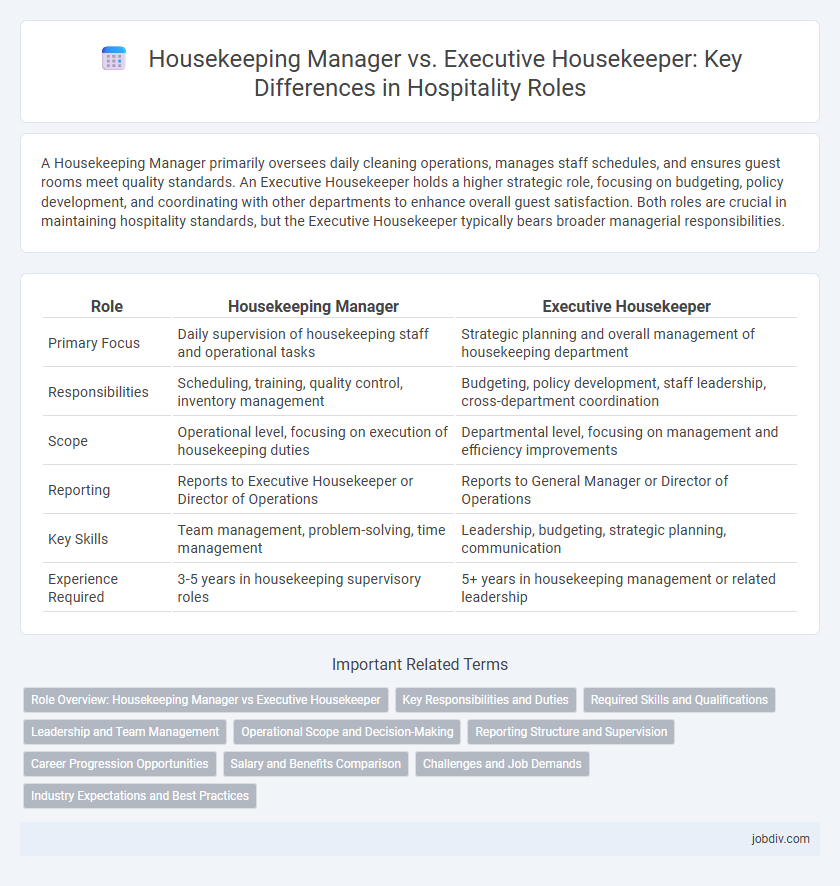A Housekeeping Manager primarily oversees daily cleaning operations, manages staff schedules, and ensures guest rooms meet quality standards. An Executive Housekeeper holds a higher strategic role, focusing on budgeting, policy development, and coordinating with other departments to enhance overall guest satisfaction. Both roles are crucial in maintaining hospitality standards, but the Executive Housekeeper typically bears broader managerial responsibilities.
Table of Comparison
| Role | Housekeeping Manager | Executive Housekeeper |
|---|---|---|
| Primary Focus | Daily supervision of housekeeping staff and operational tasks | Strategic planning and overall management of housekeeping department |
| Responsibilities | Scheduling, training, quality control, inventory management | Budgeting, policy development, staff leadership, cross-department coordination |
| Scope | Operational level, focusing on execution of housekeeping duties | Departmental level, focusing on management and efficiency improvements |
| Reporting | Reports to Executive Housekeeper or Director of Operations | Reports to General Manager or Director of Operations |
| Key Skills | Team management, problem-solving, time management | Leadership, budgeting, strategic planning, communication |
| Experience Required | 3-5 years in housekeeping supervisory roles | 5+ years in housekeeping management or related leadership |
Role Overview: Housekeeping Manager vs Executive Housekeeper
The Housekeeping Manager oversees daily cleaning operations, ensuring high standards of hygiene and guest satisfaction, while managing staff schedules and supply inventories. The Executive Housekeeper holds a senior role with strategic responsibilities, including budget management, policy development, and coordination with other hotel departments. Both positions require leadership skills, but the Executive Housekeeper focuses more on long-term planning and operational efficiency in large hospitality settings.
Key Responsibilities and Duties
The Housekeeping Manager oversees daily cleaning operations, staff scheduling, and inventory management to ensure a clean, safe, and welcoming environment in hotels or resorts. The Executive Housekeeper focuses on strategic planning, budget control, and staff training to maintain high standards of hygiene and service quality across multiple departments. Both roles prioritize guest satisfaction, compliance with health regulations, and efficient resource allocation to optimize operational effectiveness.
Required Skills and Qualifications
A Housekeeping Manager requires strong organizational skills, staff management experience, and proficiency in inventory control, typically holding a diploma or degree in hospitality management. An Executive Housekeeper demands advanced leadership abilities, strategic planning expertise, and a deep understanding of budget management, often backed by extensive experience in large-scale hotel operations. Both roles require knowledge of health and safety regulations, excellent communication skills, and the ability to train and supervise housekeeping teams effectively.
Leadership and Team Management
A Housekeeping Manager oversees daily operations, ensuring efficient workflow and maintaining quality standards, while an Executive Housekeeper drives strategic leadership, setting departmental goals and managing multiple teams across properties. The Executive Housekeeper emphasizes long-term planning and cross-departmental collaboration to enhance overall guest experience and operational efficiency. Strong leadership skills in both roles include staff training, conflict resolution, and motivation to uphold hospitality excellence.
Operational Scope and Decision-Making
The Housekeeping Manager typically oversees daily cleaning operations, staff scheduling, and quality control within a single department or property, focusing on tactical execution and immediate issue resolution. The Executive Housekeeper holds a broader operational scope, managing multiple housekeeping teams across various properties or large-scale facilities, while making strategic decisions related to budgeting, policy implementation, and long-term resource planning. Decision-making authority for the Executive Housekeeper extends to setting departmental goals and coordinating with other management functions, whereas the Housekeeping Manager primarily executes established strategies and handles routine operational challenges.
Reporting Structure and Supervision
The Housekeeping Manager typically reports to the Executive Housekeeper, overseeing daily cleaning operations and supervising housekeeping staff to ensure service standards. The Executive Housekeeper holds a senior role, responsible for strategic planning, budgeting, and overall department performance, reporting directly to hotel management or the Director of Operations. Clear reporting hierarchy improves communication, operational efficiency, and staff accountability within hospitality housekeeping departments.
Career Progression Opportunities
Housekeeping Managers typically oversee daily operations and staff management, serving as a critical stepping stone toward senior leadership roles within hospitality. Executive Housekeepers hold broader responsibilities, including strategic planning, budgeting, and policy development, making this position ideal for those aiming for director-level or corporate hospitality careers. Career progression often advances from Housekeeping Manager to Executive Housekeeper, offering enhanced leadership scope and increased influence over property-wide cleanliness standards and guest satisfaction.
Salary and Benefits Comparison
Housekeeping Managers typically earn between $45,000 and $60,000 annually, while Executive Housekeepers often command higher salaries ranging from $55,000 to $75,000, reflecting their broader responsibilities. Benefits for both roles usually include health insurance, paid time off, and employee discounts, but Executive Housekeepers may receive additional perks such as performance bonuses and leadership training programs. Salary and benefits packages vary significantly based on the size and type of the hospitality establishment, with luxury hotels offering more competitive compensation.
Challenges and Job Demands
Housekeeping Managers face challenges such as resource allocation, staff training, and maintaining high hygiene standards under tight budgets. Executive Housekeepers deal with job demands including strategic planning, compliance with health regulations, and overseeing multiple departments to ensure operational efficiency. Both roles require strong leadership skills, effective communication, and the ability to manage time-sensitive tasks in dynamic hospitality environments.
Industry Expectations and Best Practices
In the hospitality industry, a Housekeeping Manager is expected to oversee daily housekeeping operations, ensuring quality standards, staff scheduling, and guest satisfaction, while an Executive Housekeeper typically holds broader responsibilities including strategic planning, budgeting, and compliance with health and safety regulations. Best practices dictate that the Housekeeping Manager maintains operational efficiency through team leadership and resource management, whereas the Executive Housekeeper focuses on long-term departmental goals and cross-departmental coordination. Industry standards emphasize strong communication skills, attention to detail, and the ability to implement sustainable cleaning protocols in both roles to enhance guest experiences and operational excellence.
Housekeeping Manager vs Executive Housekeeper Infographic

 jobdiv.com
jobdiv.com